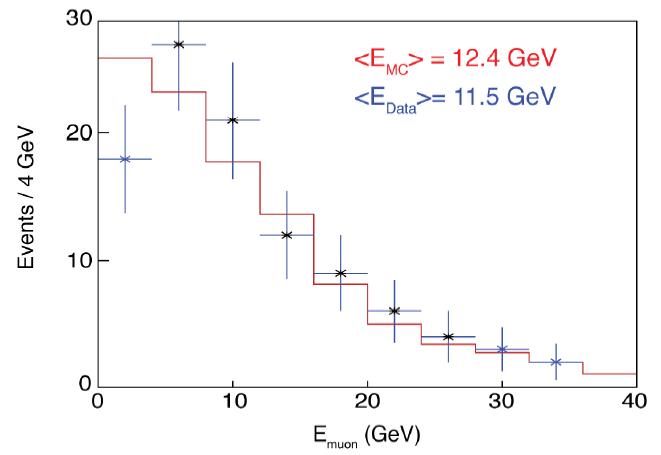
Muon momenta as detected by ICARUS in black/blue and expected energies calculated with Monte Carlo methods in red, the latter assuming neutrinos keep their energy during their journey. A different distribution would result if neutrinos were superluminal over the whole length D of the trip. (Image credit: original in the linked archive paper)
The energies of the muons agree with below light-speed-moving neutrinos over most of the long distance D from CERN, so that the superluminal part of the journey must have been over a short initial distance of about 18 meters only and in non standard model ways, as the all the previous neutrino data also indicate.
We know already why the neutrinos could go faster and what new experiments this suggests, why it does not imply time travel or violates causality, and why it is somewhat expected for neutrinos. Now the evidence is rushing in faster than light about what kind of superluminal velocity is indicated. Superluminal neutrinos would have to be indeed at least about 10 times faster than light, perhaps many times more, if they come early by 60 nano seconds over such short distances.
OR WAIT A MINUTE !
Does ICARUS actually prove this exact interpretation? No, it does not necessarily prove this exact interpretation (though what I wrote above is a possible interpretation of the results!). But my headline and write up above is no more dramatic hype than “ICARUS Refutes Opera's Superluminal Neutrinos”, another article here on Science2.0. ICARUS indeed proves neither the one nor the other.Why do we have such silly headlines on Science sites that aim for more credibility than the mainstream media especially when it comes to science then? Every new result that can be distorted into supporting establishment consensus is now hyped, as was already pointed out by Chad Orzel with “Experimentalists aren't Idiots” when another one a few days ago “proved” OPERA did not know how to use GPS (which may turn out true, but why this biased hype in favor of one certain interpretation while anything unwanted gets dismissed out of hand?).
Notice: It is not the mainstream media, it is scientists directly who hype! Not a political party, not FOX news, not Exxon or Pfizer, but here it is clearly scientists who claim they have public outreach in mind yet hype with spittle dripping from their mouths.
Science Wars
Not the media – the social structure of science is to blame for the deep crises that science is in and the justified and growing distrust that science meets, the ease with which pseudo-science sells in the public and scores in academia. We need to seriously start this discussion. I have contributed many times, also recently here warning that the neutrino saga will be used to doubt global warming, which is precisely what happened a few days after. Yet I still get only knee jerk reflex dismissal hitting under the belt.
I cannot help but slowly lose ever more trust in science myself, right along with the public. What about studies telling us that global warming is the end of the world instead of good weather on the south pole and ice-bears going brown again, like they did probably several times before? What about brand new vaccines being proven safe? I am not an expert on those issues, but if the field of nanotechnology is drenched with people who put their career before the scientific method, why would medicine under the influence of pharmaceutical companies be any better? If the field of high energy physics puts beliefs and conformity before science and this becomes the established “consensus”, why would climate science, which is politically such a high friction affair, not be much worse?
One who also started this discussion is Judith A. Curry (homepage), who in her thoughtful essays proves at least one fact: that there is more than black and white, that at least some brave scientists dare to think on the next level. This is not about warming or neutrinos, this is about the public’s trust in science! In February 2010, she published an essay called "On the Credibility of Climate Change,Towards Rebuilding Trust". This Discover Magazine interview with her is less formal and reveals a down to earth, rational person, very different from what one is used by those who refuse outright that the November 2009 “Climategate” does bear responsibility for the public’s losing confidence with what groups of scientists tell them.
Before there is no reform of publish-or-perish science, no changes in the silencing of whistle-blowers via peer review, in the sifting out of young talent as it is done today, and especially in the way communication of science to the public is left to those merely interested to make their name in a niche market, there will be likely more and more awakening to the fact that science cannot be trusted any longer, that it has become little more than an evolved system that has primarily its own survival at heart, regardless the costs to society.
In a modern, through and through technological world where decisions are partially come by with democratic means, the public turns away from science. Who sees a problem?
--------------------------------------------




Comments